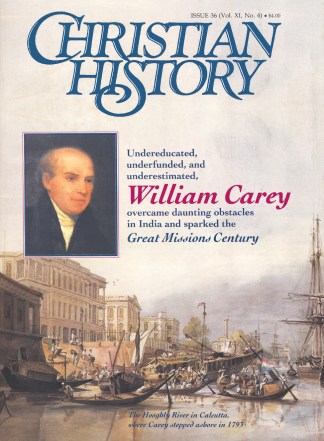Until age 14, William Carey later wrote, “I was addicted to swearing, lying, and unchaste conversation; which was heightened by the company of ringers, … foot-ball players, the society of a blacksmith’s shop … and though my father laid the strictest injunctions on me to avoid such company, I always found some way to elude his care.” His father was clerk of the local Church of England parish, so William was required to attend worship. But he said, “of real experimental religion, I scarcely heard anything till l was fourteen years of age.” That’s when he met John Warr, a fellow apprentice cobbler and a devout Dissenter. (“Dissenters” were Baptists, Congregationalists, Presbyterians, and Quakers who renounced certain doctrines and practices of the Church of England.)
Warr shared his books and “radical” ideas with Carey, who, even though a lukewarm Anglican, argued according to the anti-Dissenter prejudices of his day. In their shoeshop debates, Carey nearly always had the last word, though afterward he admitted to feeling “stings of conscience.”
Conscience of a Cheat
Nearly two years into his apprenticeship, when he was 15, those stings became acute. As he delivered goods to various customers in the village, the local ironmonger gave him a shilling as a Christmas gift. When Carey went to buy himself a treat with it, he discovered it was counterfeit. So he exchanged it for a genuine shilling from the money his master, Clarke Nichols, had entrusted him. He would tell his master one of his customers had paid in counterfeit.
Carey later recalled, “I prayed to God to excuse my dishonesty and lying for this once, I would never repeat such an action, but would break off with sin thenceforth. My wickedness prevailed, and I told the falsehood.” Nichols, though, discovered the truth. “I … was so overwhelmed with shame that it was a considerable time before I went out,” Carey admitted.
He meant he stopped attending worship services, though his new spiritual concern drove him to prayer meetings. He was gradually brought “to depend on a crucified Savior for pardon and salvation.”
That decision was crystallized when Carey was 17. A national day of prayer had been called because the war with the rebellious American colonies had taken a bad turn. Carey was attending a Congregationalist worship service, and the preacher’s text was Hebrews 13:13 “Let us therefore go out unto him without the camp, bearing his reproach.”
“I think I had a desire to follow Christ,” he later wrote, “but … I concluded that the Church of England, as established by law, was the camp in which all were protected from the scandal of the cross, and that I ought to bear the reproach of Christ among dissenters.” In the next four years, he would slowly fine-tune his theology, finally rejecting his infant baptism and becoming a Particular Baptist.
Mark Galli is associate editor of Christian History.
Copyright © 1992 by the author or Christianity Today/Christian History magazine.Click here for reprint information on Christian History.










